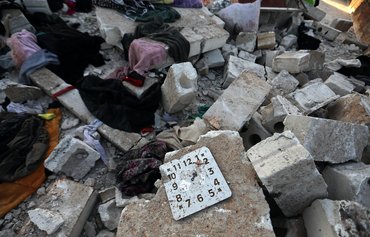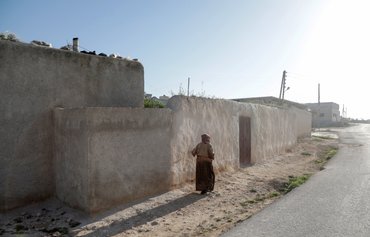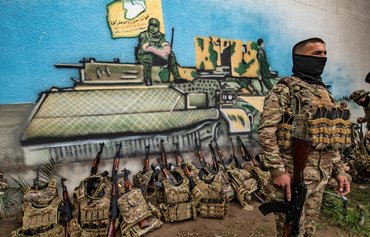HAMA -- At a market in the city of Hama in central Syria, bags are brimming with desert truffles, a seasonal delicacy that residents risk their lives to collect, braving "Islamic State of Iraq and Syria" (ISIS) attacks and landmines.
Truffles, a fungus known as "kemmeh", are collected in desert areas after rainfall. They are cooked in a variety of ways -- roasted, stewed, grilled, fried, stuffed or used in a salad or soup -- prepared with meat or eggs, or just eaten alone.
"It's a treat dipped in blood," said vendor Mohammed Salha, 31, showing off truffles he spent a week collecting near his village.
"Every day I leave my house not knowing whether I will come back to my wife and daughter," he said, dark circles lining his weary eyes. "We risk our lives ... but we don't care anymore; we want to feed our children."
![Merchants sort through desert truffles at a stall in a market in Hama on March 6. [Louai Beshara/AFP]](/cnmi_am/images/2023/03/24/41100-Hama-truffle-merchants-600_384.jpg)
Merchants sort through desert truffles at a stall in a market in Hama on March 6. [Louai Beshara/AFP]
Between February and April, hundreds of impoverished Syrians search for the delicacy in Syria's vast eastern desert (Badiya) -- a known hideout for extremist elements that also is littered with landmines.
So far this season, at least 150 truffle hunters have been killed, mostly in ambushes by ISIS elements or in landmine blasts, according to the Syrian Observatory for Human Rights.
ISIS on Thursday (March 23) killed at least 15 people by cutting their throats, including seven civilians, as they foraged for desert truffles in Hama province, the Syrian Observatory for Human Rights said.
Forty others are missing following the attack.
On February 17, 68 people were killed in an ambush carried out by extremists on motorcycles as they hunted for truffles in the desert east of Homs and at a checkpoint -- the deadliest such incident in more than a year.
Militias affiliated with Iran's Islamic Revolutionary Guard Corps (IRGC) also subject truffle hunters to extortion, forcing them to sell their products at very low prices, activists say.
"These militias force [the truffle collectors] to sell them the harvest for less than half the market price, or to give up a third of the harvest," Deir Ezzor activist Ayham al-Ali told Al-Mashareq.
On March 10, 12 civilians were kidnapped while hunting for truffles in the desert, a media activist told Al-Araby al-Jadeed.
Unknown gunmen on motorcycles, believed to be affiliated with Iran-backed militias, kidnapped 12 people in the Nadra area of Jabal al-Bishri, southwest of Deir Ezzor, while five others managed to escape, he said.
'Blood on their clothes'
Known for their high quality, Syria's desert truffles fetch high prices.
At the market in Hama, they can sell for up to $25 per kg depending on size and grade -- in a country where the average monthly wage is about $18.
"We make big profits during the two months of the truffle season, but we risk our lives," Salha said with a pained smile.
Truffles big and small bulged from baskets, trays and hessian bags, some propped up on plastic crates or sitting directly on the footpath.
"Auction! Auction!" yelled one of dozens of vendors as wholesale buyers crowded around to bid for a 50kg lot.
Seller Omar al-Boush opened the auction at the equivalent of $4.50 per kg in Syrian pounds -- and the price had soon almost doubled.
"We have types of truffles suited to people with middle class incomes," al-Boush said. "Some families prefer to buy truffles instead of meat."
Different types of truffles are collected in the desert, which stretches across central Syria to the eastern border with Iraq.
Sellers said the black truffle found in desert areas of Hama and Aleppo provinces fetches the highest prices.
Jamaleddine Dakak, a wholesaler from Damascus, said some traders bought high-quality truffles and exported them to Iraq and Lebanon, while others are reportedly smuggled to the Gulf states through Jordan.
Vendor Yusuf Safaf said he bought his truffles from Bedouin who came to Hama in the mornings -- some with "blood on their clothes".
"Some have lost family members while collecting truffles, but they keep doing it ... because they have no choice," he said. "There are landmines, bandits and vast stretches" where ISIS is present.
"People sacrifice their lives ... just to support themselves," he said.
'Like a game of cards'
Foragers take the risk despite repeated warnings in the Syrian media.
In one report earlier this month, a military source warned people against hunting for truffles "as some areas have not yet been declared safe" from landmines and ISIS fighters.
Jihad al-Abdullah, 30, lost his leg when a mine exploded as he was driving to collect truffles east of Hama.
He now gets around on crutches, yet he said he still sometimes goes out foraging and has spent much of this season selling truffles his brothers have collected.
"I have nothing to lose after I lost my leg," said al-Abdullah, stretched out on the ground near his stall. "I continue my work to make a daily living. The rest is up to God."
Across Syria, more than 10 million people live in areas contaminated by explosive hazards, according to the United Nations (UN).
Explosives planted in fields, along roads or even in buildings by all sides in Syria's conflict killed 15,000 people between 2015 and 2022, according to UN figures.
Al-Abdullah said collecting truffles was like playing a game of cards.
"Sometimes you win; sometimes you lose," he said. "It's a gamble that I have accepted."

![A merchant sorts through desert truffles at a market stall in Hama on March 6. Between February and April, hundreds of impoverished Syrians search for 'yellow gold' in Syria's vast eastern desert. [Louai Beshara/AFP]](/cnmi_am/images/2023/03/24/41101-33an27n-preview-600_384.jpg)
![A merchant presents desert truffles at a market stall in the city of Hama on March 6. Truffles of different types and sizes are collected at great personal risk. [Louai Beshara/AFP]](/cnmi_am/images/2023/03/24/41102-truffle-seller-Hama-600_384.jpg)
![A merchant presents desert truffles at a market stall in Hama on March 6. Syrians have continued to gather the desert delicacy despite warnings that many areas are not safe. [Louai Beshara/AFP]](/cnmi_am/images/2023/03/24/41103-truffles-all-sizes-600_384.jpg)
![Merchants present their desert truffles at a market in Hama. So far this season, more than 130 truffle hunters have been killed, mostly by extremist attacks and landmines, the Syrian Observatory for Human Rights says. [Louai Beshara/AFP]](/cnmi_am/images/2023/03/24/41104-Hama-truffle-merchants-600_384.jpg)
![A merchant presents desert truffles at a stall in a market in Hama on March 6. Sellers can make big profits during the two months of the truffle season but risk their lives to gather the delicacy. [Louai Beshara/AFP]](/cnmi_am/images/2023/03/24/41105-Truffle-vendor-Hama-600_384.jpg)
![A merchant assists customers shopping for desert truffles in Hama on March 6. Truffles can sell for up to $25 per kg depending on size and grade. [Louai Beshara/AFP]](/cnmi_am/images/2023/03/24/41106-Merchant-assists-shoppers-600_384.jpg)






